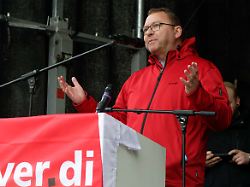After the IG Metall initiative
Verdi boss does not rely on a four-day week
September 12, 2023, 12:10 a.m
Listen to article
This audio version was artificially generated. More info | Send feedback
IG Metall is starting collective bargaining with the demand for a four-day week with full wage compensation. The Verdi boss doesn’t want to follow suit. The model is not suitable for the service industry, he says. Instead of shorter working hours, Werneke relies on significantly higher wages.
Unlike IG Metall, the chairman of the Verdi union, Frank Werneke, does not see a four-day week as a suitable working model in the service industry. “In the steel industry we are dealing with a 24-hour shift model that is not easily transferable to other industries,” Werneke told the editorial network Germany (RND). “I don’t see the four-day week as a general working model for the service industries.”
IG Metall started the upcoming collective bargaining round for the steel industry on Wednesday with a demand for a wage increase of 8.5 percent and a reduction in weekly working hours to 32 hours with full wage compensation. “This reduction in working hours would be the introduction to the four-day week, which will become possible in many areas,” said IG Metall NRW.
The Verdi boss would like to position himself differently: “In the current collective bargaining rounds, we are putting the question of income in the foreground because of the development of inflation,” Werneke explained to the RND. “But I am sure that in the medium term the question of working hours will also become more important in the service sectors.”
“AI will significantly change service professions”
The use of artificial intelligence will also change the world of work, Werneke explained. “I wouldn’t speak of a threat,” he said. “But the service professions in particular will change significantly through the use of AI,” he explained. “Activities will also be eliminated, no question about it.” At the same time, there is also a shortage of workers. “That’s why I don’t think we’re experiencing a situation like the 70s or 80s, where automation processes led to an increase in unemployment,” Werneke told RND.
The use of AI could also lead to talk of a reduction in working hours. “AI will lead to a significant jump in productivity, especially in service professions,” predicted Werneke. “Of course the question then arises as to who will pocket this digitalization dividend,” said the Verdi boss. “And as a union we are of the opinion that this should also be reflected in additional free time for the employees.”
At the same time, Werneke insisted on a minimum wage of 14 euros and warned that an increase that was too low could lead to dissatisfaction with politics. The increase in the minimum wage is definitely too low, said Werneke. “The recommendation of the Minimum Wage Commission was decided against the votes of the unions.” The Commission recently proposed an increase in the minimum wage from the current 12 euros by 41 cents over the next two years.
